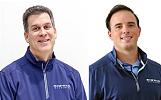Senior Editor
- FMA
- The Fabricator
- FABTECH
- Canadian Metalworking
Categories
- Additive Manufacturing
- Aluminum Welding
- Arc Welding
- Assembly and Joining
- Automation and Robotics
- Bending and Forming
- Consumables
- Cutting and Weld Prep
- Electric Vehicles
- En Español
- Finishing
- Hydroforming
- Laser Cutting
- Laser Welding
- Machining
- Manufacturing Software
- Materials Handling
- Metals/Materials
- Oxyfuel Cutting
- Plasma Cutting
- Power Tools
- Punching and Other Holemaking
- Roll Forming
- Safety
- Sawing
- Shearing
- Shop Management
- Testing and Measuring
- Tube and Pipe Fabrication
- Tube and Pipe Production
- Waterjet Cutting
Industry Directory
Webcasts
Podcasts
FAB 40
Advertise
Subscribe
Account Login
Search
What is new is not so new
- By Tim Heston
- August 13, 2009
But I come back with a new perspective. If you can't learn something on a visit to Washington, D.C., you're just not paying attention.
In several Washington museums and memorials, the story of Abraham Lincoln is front and center. This makes perfect sense as our 16th president is looked upon as one of the greatest leaders in this country's history. But the timing is special as well: It's Honest Abe's 200th birthday.
So visiting the sites, listening to the tour guides, and reading the museum placards, I have a new understanding of just how a smart young man navigated the unruly waters of early American politics and how he remained committed to his vision of keeping the union together.
I also understand that the world of then is similar to the world of today in some respects. Everyone likes to think that the world of their ancestors is about as relevant as the world of Buck Rogers, but some people know that if you don't learn from history
So what have I realized?
- Politics is a hardball sport and always has been. One could argue that discourse has grown uncivil, but I would argue that it's just louder because more microphones are shoved into people's mouths. When Stephen Douglas, Lincoln's famous debating opponent, made fun of Lincoln because he sold whiskey while being a storeowner, Lincoln shot back by saying that he had left his side of the bar long ago, but knew that Douglas likely was still occupying his side as a customer. I've never heard a charge like that levied during a televised debate in recent memory.
- The feeling that the U.S. can't agree or come together for the betterment of the country is hardly new. Lincoln was the underdog heading into the Republican convention of 1860, behind the favorites William Seward and Salmon Chase, but eventually emerged as a sort of compromise candidate because of his western origins and lack of political enemies. Even when he ran for president, he won with less than 50 percent because he ran against three other candidates: Democrat Stephen A. Douglas, John C. Breckinridge of the Southern Democrats, and John Bell of the Constitutional Union Party.
- Polarization in U.S. politics is a constant. Check out the Electoral College breakdown for the 1860 election. I imagine that bloc of southern states has voted similarly in many presidential elections since then.
- This country is remarkably resilient. The Civil War resulted in more than 1 million deaths, including more than 600,000 soldiers, and Lincoln was assassinated only days after General Robert E. Lee surrendered. It is hard to comprehend the emotions of the day, but the union survived.
- The presidency is no easy job. Pictures of presidents are great indicators of the large responsibility these people carry and how it takes its toll on the human body.
What does this mean for metal fabricators? Stand up and be heard, preferably in an organized manner and in a civil tone. But if you can't handle that, grab a bullhorn and organize a tea party or whatever those things are that Fox News is not organizing.
I'm thinking of all this as I watch this health care legislation debate play out. It's loud. It's contentious. It's not the end of the world, although some people are playing it out to be. This union will survive.
Lady Freedom is a fighter even if she might be a little cross-eyed.
subscribe now

The Fabricator is North America's leading magazine for the metal forming and fabricating industry. The magazine delivers the news, technical articles, and case histories that enable fabricators to do their jobs more efficiently. The Fabricator has served the industry since 1970.
start your free subscriptionAbout the Author

Tim Heston
2135 Point Blvd
Elgin, IL 60123
815-381-1314
Tim Heston, The Fabricator's senior editor, has covered the metal fabrication industry since 1998, starting his career at the American Welding Society's Welding Journal. Since then he has covered the full range of metal fabrication processes, from stamping, bending, and cutting to grinding and polishing. He joined The Fabricator's staff in October 2007.
- Stay connected from anywhere

Easily access valuable industry resources now with full access to the digital edition of The Fabricator.

Easily access valuable industry resources now with full access to the digital edition of The Welder.

Easily access valuable industry resources now with full access to the digital edition of The Tube and Pipe Journal.
- Podcasting
- Podcast:
- The Fabricator Podcast
- Published:
- 04/16/2024
- Running Time:
- 63:29
In this episode of The Fabricator Podcast, Caleb Chamberlain, co-founder and CEO of OSH Cut, discusses his company’s...
- Industry Events
16th Annual Safety Conference
- April 30 - May 1, 2024
- Elgin,
Pipe and Tube Conference
- May 21 - 22, 2024
- Omaha, NE
World-Class Roll Forming Workshop
- June 5 - 6, 2024
- Louisville, KY
Advanced Laser Application Workshop
- June 25 - 27, 2024
- Novi, MI































